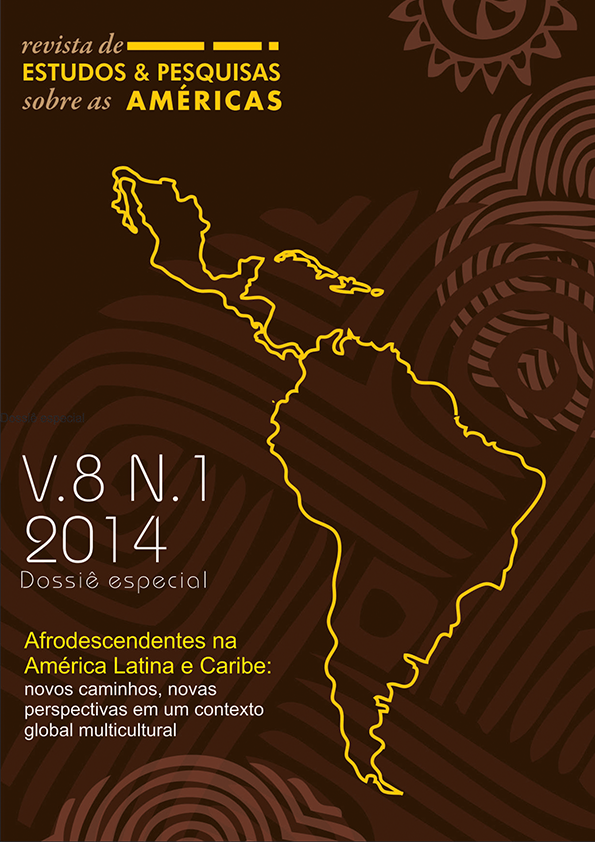ARTICULAÇÕES DA NEGRIDADE: Políticas e tecnologias da diferença na Colômbia
Abstract
Com a inflexão do multiculturalismo, a imaginação política e teórica na Colômbia articulou uma noção de negridade no seio de um grupo étnico. Foi dessa maneira que se foi consolidando a ideia de “comunidades negras” com práticas tradicionais de produção, em uma relação harmônica com a natureza e com a propriedade coletiva de seus territórios e com uma identidade cultural característica. Na última década, no entanto, tem emergido uma nova articulação da negridade a partir das políticas de ações afirmativas, impulsadas por uma crescente problematização em torno do “afrodescendente”. Esse artigo examina as políticas da diferença que articulam a negridade na inflexão do multiculturalismo e das ações afirmativas, em busca de evidenciar não somente suas diferenças, mas também, seus ganhos e limitações.
Palabras chaves:Â Etnização, negridade, comunidades negras, afrodescendentes, afrocolombianos
---
ARTICULACIONES DE NEGRIDADE: Políticas y tecnologías de la diferencia en Colombia
Con la inflexión del multiculturalismo, en Colombia la imaginación política y teórica articuló una noción de negridad en clave de un grupo étnico. Fue así cómo se fue consolidando la idea de las ‘comunidades negras’ con unas prácticas tradicionales de producción en armónica relación con la naturaleza y con propiedad colectiva sobre sus territorios y con una identidad cultural característica. En la última década, sin embargo, ha ido emergiendo una nueva articulación de la negridad a partir de las políticas de acción afirmativa impulsadas por una creciente problematización en términos de lo “afrodescendiente”. Este artículo examina las políticas de la diferencia que articulan la negridad en la inflexión del multiculturalismo y de las acciones afirmativas, en aras de evidenciar no sólo sus diferencias sino también sus logros y limitaciones.
Palabras-claves: Etnización, negridad, comunidades negras,
afrodescendientes, afrocolombianos
---
ARTICULATIONS OF BLACKNESS: Policies and technologies of difference in Colombia
With the inflection of multiculturalism, the political and theoretical imagination in Colombia came up with the concept of blackness within an ethnic group. That is how the idea of "black communities" was consolidate with its traditional practices, in a harmonious relationship with nature, with the collective ownership of their lands and typical cultural identity. In the last decade, however, a new idea of blackness from affirmative action policies appeared, fueled by the evergrowing problematization surrounding the "African descent". This article examines the politics of difference that articulate blackness in the inflection of multiculturalism and affirmative action, seeking to highlight not only their differences, but also their gains and limitations.
Keywords: Ethnicization, blackness, black communities, Afro-Colombians
Downloads
Published
Issue
Section
License
The published material is the property of the Journal, and may be reproduced in whole or in part with indication of the source.
Copyright: Authors will be responsible for obtaining the copyright of the material used. Authors who publish in this journal agree to the following terms:
a)Authors retain the copyright and grant the journal the right of first publication, with the work simultaneously licensed under
the Creative Commons Attribution License which allows the sharing of work with acknowledgment of authorship and initial publication in this journal.
b) Authors are authorized to take additional contracts separately, for non-exclusive distribution of the version of the work published in this journal (eg, publish in institutional repository or as a book chapter), with acknowledgment of authorship and initial publication in this journal.
c) Authors are allowed and encouraged to publish and distribute their work online (eg in institutional repositories or on their personal page) at any point before or during the editorial process, as this can generate productive changes as well as increase the impact and the citation of the published work (See The Effect of Free Access).
















